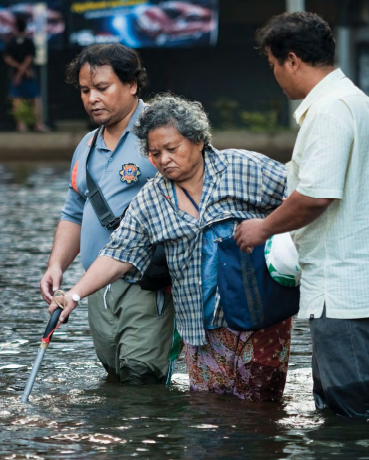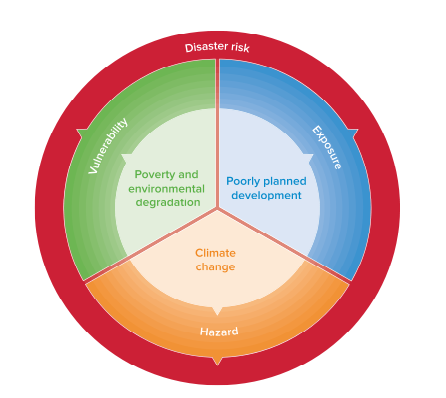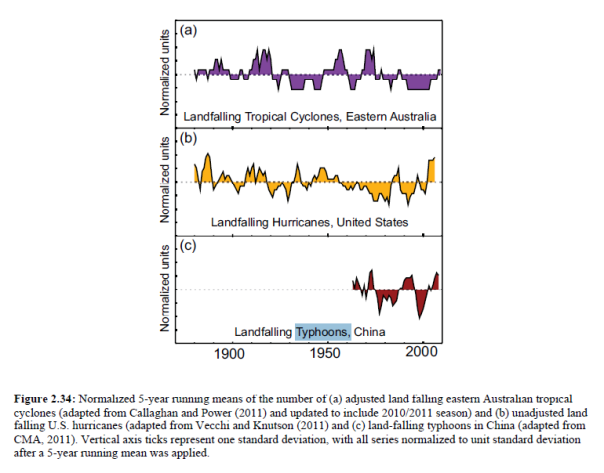The Royal Society, formerly a highly regarded institution, is increasingly abandoning science in favour of political propaganda. Its latest piece of scaremongering, Resilience to extreme weather, is packed full of emotive images of floods
and completely vacuous graphics like this:
(there are at least 4 such meaningless diagrams) but contains virtually no science.
In the introduction, Paul Nurse claims that “By presenting evidence of trends in extreme weather and the different ways resilience can be built to it, we hope this report will galvanise action by local and national governments…”.
But unfortunately Nurse and his chums seem to have forgotten to include any evidence of trends in extreme weather. All we get is examples and anecdotes. Throughout the entire 100+ page report, there is not a single graph showing past trends in extreme events (there are plenty showing the results of speculative computer models for the future).
Graphs of UK rainfall are often shown at Paul Homewood’s blog, for example in his recent post Rainfall Patterns In The South West, relevant to the Somerset flooding, where it can be seen that there is no trend in rainfall and the wettest month occurred in 1929. I wonder why no such graphs are shown in the Royal Society report?
Similarly there is no data provided in the report on hurricanes and typhoons, despite there being a suitable figure on this in IPCC AR5 WG1 Chapter 2:
Hurricane Sandy is mentioned several times in the report, but there is no mention of the current record-breaking lull in hurricane activity.
Tucked away in the middle of the report are the distinctly un-alarming remarks from the IPCC SREX (2012), such as “Low confidence that anthropogenic warming has affected the magnitude or frequency of floods at a global scale”.
Roger Pielke has a useful summary of what the IPCC AR5 had to say about extreme events. He ends with “Of course, I have no doubts that claims will still be made associating floods, drought, hurricanes and tornadoes with human-caused climate change — Zombie science…” I wonder what he would make of this report by the Royal Society?
On P.109 of the report we are told that it was reviewed by a panel of eight experts before being accepted by the Royal Society. So it is curious that amateur blogger Andrew Montford managed to find a basic error in it so quickly. Maybe they should employ him in future to check their reports for errors?



One wonders whether there is pressure from outside the RS to produce reports such as this or whether Paul Nurse is just enamoured of the subject.
Reblogged, and commented:
The RS rely on govt for 67% of their income.
Is it any wonder they produce such a politicised report? How long will we have to wait before Ed Davey, or some other minister, uses this report to “justify” government actions?
In the right hand column of the RS article you link to is an invitation to “Read and respond to blog posts about resilience to extreme weather on our In Verba blog.”
The RS has published 25 blog posts on resilience in the past 2 years. I looked at the most recent five, which had picked up a total of zero comments. Comments are now closed. I suggest we keep our eyes skinned for the next one, which should be along in a moment…
If you want well documented information and good graphics and charts, I recommend you http://1ocean-1climate.com/climate-changes-today.php, with a realistic analysis on climate change in the past and in our days. You cand read, here, some ideas on how our activities on sea influenced climate.
This is hardly science the RS is rabbiting on about, its a series of opinions not backed up by facts and therefore a huge waste of effort on their part, and in fact disgraceful as a supposed peer group in Science. The AGW protagonists are definitely on the backfoot scientifically and politically as the negative effects of IPCC renewable energy policies on global economics is self evident. About time too as the public becomes ever more confused about the supposed dire effects of climate change when the positive ones such as increased greening of the planet and higher crop growth due to increased CO2 are already being felt.
The RS should be leading the debate about the validity of AGW instead of blindly following the IPCC’s lead that is not based on empirical science but invalidated computer models that cannot be justified to drive climate policy and wreck the current stable though evolving fossil fuel energy situation that is providing such sustainable benefits to both developed and underdeveloped nations.
The Royal Society report is getting some criticism in the media.
In The Spectator, Ross Clark asks why we never hear about the beneficial aspects of warming, pointing out that the report mentions heatwave deaths but not reduced winter deaths.
And at The Telegraph Christopher Booker writes about their noble cause corruption, referring to Pielke’s book.
The Royal Society is advertising a “launch” of its report, on Wednesday in London, which seems a bit odd – I thought they launched it last week.
Geoff, thanks, I hadn’t noticed the blog, with its rather appropriate Tolkien fantasy analogy. The video there is bizarre – various people who appear to be in prison cells or old people’s homes waffle about what they think resilience means.
There is now a new blog entry that’s open for comments, written by Georgina Mace who chaired the team that produced the report.
Another criticism of the Royal Society report comes from Matt Ridley in The Times and at GWPF.
He points out the lack of evidence for severe weather in the report, and notes the irony of Paul Nurse’s comments that “We need to be aware of those who mix up science, based on evidence and rationality, with politics and ideology, where opinion, rhetoric and tradition hold more sway. We need to be aware of political or ideological lobbyists who do not respect science, cherry-picking data or argument, to support their predetermined positions.”
The Royal Society were quoted on the BBC once again, late last year, condemning the dredging of the drainage channels on the Somerset Levels.
Apparently, they are desperately in need of future flooding events in order to further their attempts to stage-manage the formerly much vaunted global thermogeddon and climate disruption apocalypse.
With the Parrett drainage channel now cleared of silt for several miles, the Royal Society may hope that the problem of potential flooding has now been moved downstream to an undredged bottle-neck.
Of course, the worst nightmare for the Royal Society would have been realized if the channel had been cleared all the way to the sea.
Depositing river water in the sea is, as we are all aware, a major contributor to accelerating sea level rise.
But, the concern for the Royal Society would have been the return to successful operation of the man-made drainage system after years of enforced neglect.
As we all now know, ideally drainage channels should discharge their water into the living quarters of the perplexed local citizenry.
The suffering of ordinary British folk can then be paraded on the BBC and blamed squarely on climate change.
Home-owners can then be advised help to slow the run-off by establishing a peaty bog-land area in spare rooms.
Instructions on how to raise indoor wet-land plants are available on the environment agency website.
When Victorian engineers presided over the drainage works, the works worked.
Now, with the advantages of modern technology at our finger tips, we have all gone daft.
Very few people have any chance of understanding just how daft they have gone.
But we know. Wink wink.
Keep up the good work.